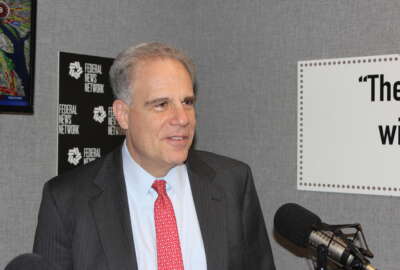
Success in the contracting world is not just about winning bids
For small businesses contracting with the federal government, cash flow, borrowing costs, and a healthy balance sheet are just as important as winning bids.
Best listening experience is on Chrome, Firefox or Safari. Subscribe to Federal Drive’s daily audio interviews on Apple Podcasts or PodcastOne.
For small businesses contracting with the federal government, cash flow, borrowing costs, and a healthy balance sheet are just as important as winning bids. For some tips on sharpening up that financial strategy in the age of pandemic, the Federal Drive with Tom Temin turned to the director of operations at business lender Parabilis, Ryan Huss.
Interview transcript:
Tom Temin: Mr. Huss, good to have you on.
Ryan Huss: Thanks for having me, Tom.
Tom Temin: Now, your idea here is that there is some financial strain on small businesses because of the pandemic. And yet federal contracting as we enter the fourth quarter is at an all-time high. So what is the challenge for small businesses?
Ryan Huss: So small and medium-sized government contractors, their main challeng is, typically, cash flow. And so, while most of their revenue is protected during this pandemic, the cash flow problem never really goes away for them and is just going to continue to be disrupted by the pandemic. So I think the issue here is the Paycheck Protection Program is expiring in a couple weeks. A lot of the protections that are afforded to government contractors will probably still be in place but it doesn’t mean that it will be without destroyed option. So the idea here is to figure out a way to manage that cash flow and not assume that protection is going to continue.
Tom Temin: I mean, the old saying is you can die on your receivables. And for federal contractors, there’s that lag between even when you win, and when you actually start getting work. And then when you actually start getting paid, and that kind of contributes to the cash flow crunch.
Ryan Huss: That’s correct. I think small business government contractors never fully escape that problem. So they’re going to need some type of working capital funding solution to fix that problem. That’s effectively what we do at Parabilis. There’s other ways to fix it. But I think there’s a couple issues that are forming here. One is banks are going to continue to tighten up. We might be in a kind of a false recession here. But if we’re fully tied to the pandemic, and all the effects of it and the responses of the government to it, then if another outbreak occurs in the next couple of months, you can assume that economic activity is going to be kind of tumultuous. So with that the thinking is, try to find some way to get cash flow into your business and don’t assume that coming into award season that everything’s just going to be great, and that growth will fix that problem. I think there’s unexpected disruptions that could occur. So the idea is think through that now rather than later.
Tom Temin: And how do you get cash flow? And it seems like borrowing could negatively affect the cash flow because it adds on more cost.
Ryan Huss: Sure. So the idea behind getting good debt, whether it’s from a bank or someone like Parabilis, is you using other people’s monies to effectively propel your growth. And if you use it intelligently, then it’ll just propel them to new heights. The cost of debt is really the main thing that I think contractors need to pay attention to. So if a bank is typically at half a point of revenue and total cost of capital on an income statement–someone like parabolas might be at 1%–and there’s many other options that are kind of distant past that, but the question really all contractors need to ask themselves is what is the return on an investment? And the investment in that … situation is your cost of capital. So think about it like that. When you win a contract that’s $1 million, and it nets you $50,000 of profit, and it only costs you $10,000 in borrowing costs, well, that’s a return on investment of 400%. It’s significant. So if you can’t get the contract or you can’t support the contract without somebody else’s money, then that is when good debt makes sense.
Tom Temin: Got it. And can that kind of good debt increase your liquidity?
Ryan Huss: Absolutely. So the main challenge, again, here is working capital. So you need to be able to pull cash into the present to pay current expenses, even though you’re waiting on receivables to be paid. So what you’re effectively creating is cash flow. And that is the biggest challenge that contractors have.
Tom Temin: We’re speaking with Ryan Huss. He’s director of operations at business lender Parabilis. And when you encounter small businesses and maybe those from the disadvantaged categories, what is the biggest issue they have with respect to understanding their own finances? I mean, do they come to this with maybe an overly simplistic view of how you operate a business with lots of moving parts?
Ryan Huss: Yes. So oftentimes, government contractors are started by those who have executed that type of work, maybe from the government side and military side. And so they’re subject matter experts in that realm. But what they might not have done before was run a business or they might not have thought through financial strategy or all the different aspects of the business. So usually the best core competency is execution of that type of work, and then winning of the business. But I think what oftentimes falls distant is financial strategy and understanding how am I going to manage the financial health of my company? And oftentimes, what we recommend is to find another partner that can give you an objective view to help you think that through and this would be a financial strategist, not necessarily just a CPA, who balances the books, but someone who’s really met a CFO, another company, or an outsourced CFO organization that is going to help you think through all the different things that could occur over the next three to five years as you’re trying to be successful growing your company because there’s a large percentage of government contractors that fail in the first couple of years and I think this is probably one of the main reasons why, because they haven’t really done that advance planning and figured out what does it mean to be profitable? How am I going to pay all of my operating expenses, if any number of issues arise? The unique part of that government contracting is that you can win in 10x overnight. And the other side of that is you can lose a contract overnight, and you can decrease overnight. And that is a simplistic way of saying there’s there’s unique elements to this market that both provide a lot of benefits, but also provide a lot of pitfalls to these contractors. So learning how to manage those pitfalls is something that pay a lot of dividends in the future.
Tom Temin: I guess a lot of small businesses maybe don’t fully understand their own balance sheets, which in some sense, is the real scorecard of business. So a lot of cash flow means you could still have decreasing liquid assets and therefore your profits could suffer long term.
Ryan Huss: That’s correct. If you were to sit down with a financial strategist, they would be able to help you think through what does your balance sheet look like over the next year? What do you want it to look like over the next year, maybe even three to five years? And then do you need to make investments? Do you think that acquiring another company will be necessary? Do you want to make investments in any type of assets like intellectual property or do you need to acquire equipment for the kind of contracts that you’re going after? These are things that you need to put financial assets in place in order to get to that point to understand how you’re going to get there, is really the roadmap. And I think oftentimes, the first thing to focus on, the contractors, is getting someone to balance the books, and they think, if I just have my financials in order, that’s kind of all I need. And that is a great first step. But that step beyond that is how am I going to advance plan beyond that? And I think a financial strategist is really someone that you can count on to provide that objective view and really lay out the roadmap. And there’s a lot of benefits to that. And you can hire them short term, if you hire someone who’s kind of on the outsourced side versus finding a permanent CFO, is very difficult, right? So, on the outsourced side of things, you can pay them short term pay them monthly pay them for their performance. They’re heavily incented for that. They have a lot more repetitions under their belt. They’ve helped maybe dozens, hundreds of clients and most critically, they have that strategic mind and they have an outside perspective, which is crucial to kind of objective planning.
Tom Temin: Just a word about Parabilis itself. You characterize the company as a business lender, but it’s not a bank. So does it also offer those kinds of advisory and analysis services?
Ryan Huss: So what we do is provide lines of credit very similar to what a bank would provide. But we provide greater access to capital and increased flexibility, because we’re not federally regulated. And so in addition to that, our company was founded by veterans and former government contracting executives, people who have owned those businesses and operated them on the other side, so really have a true understanding of being in the shoes of the government contractor. And so the ways that we can be creatively helpful is kind of infinite relative to what a bank might be able to provide. And so I think, as we’re looking at this current economic picture in a false recession, or maybe some continued disruption in the economy, there’s probably gonna be a tightening of the credit aperture of banks. There might be some companies that find themselves without a bank. There might be companies that were hoping to have a bank, help them support them. Award season’s coming up in October. And I think if you can find a partner that has been in your shoes, and also can provide you the same type of good debt that a bank can provide, you’re probably ahead of the game. And so I think now is the time to secure that partnership and someone who speaks your language. And I wouldn’t wait on it is really the the main point I’d like to get across.
Tom Temin: Sure. And of course, you still have to consider the cost of the money. That is to say, you don’t want someone loaning you at 20% versus a bank that might do it at 10% or 5%.
Ryan Huss: That’s right. There’s a mixed bag of lenders that, if you’re not a bank, of non-bank lenders out there, or factoring companies or, you know, working capital funding providers that are fairly expensive, and where we sit is between those alternative solutions that are fairly expensive and a bank. And so we’re more expensive than a bank, but what we provide is a lot of increased flexibility and a lot of benefits that go alongside that. And it’s going to feel similar to what a bank provides, but just with greater flexibility and at times, depending on the bank, greater expertise in this space.
Tom Temin: Interesting Ryan Huss is the director of business operations at the lender Parabilis. Thanks so much for joining me.
Ryan Huss: Thank you, Tom.
Copyright © 2025 Federal News Network. All rights reserved. This website is not intended for users located within the European Economic Area.
Tom Temin is host of the Federal Drive and has been providing insight on federal technology and management issues for more than 30 years.
Follow @tteminWFED
Related Stories





